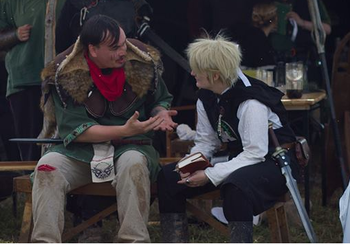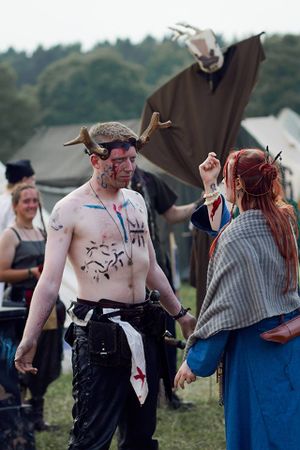Navarr religious beliefs
mNo edit summary |
mNo edit summary |
||
| (35 intermediate revisions by 7 users not shown) | |||
| Line 1: | Line 1: | ||
Navarr priests are called | {{CaptionedImage|file=GuideAdvises.png|width=350|align=right|title=Navarr priests see the entire Empire as their congregation, not just their fellow Navarr|caption=The guides help people to find their place in the [[Navarr Culture and Customs#The Great Dance|Great Dance]]}} | ||
Navarr priests are called Guides, partly because of the guidance they try to give the Navarr, but more for the practice of trying to guide people to their rightful place in the [[Navarr Culture and Customs#The Great Dance|Great Dance]]. Although all Navarr see life in terms of the Great Dance, what makes the Guides unique is their concern for the virtue of the people they help. Guides understand that virtue is not inherent in an individual, that it is a product of the person and their circumstances. By helping a person change their circumstances, by guiding them to a place more suited to their temperament, they can help that person become more virtuous. | |||
Guides also work to bring partners together, finding people whose spirits or virtues | Guides also work to bring partners together, finding people whose spirits or virtues complement each other, or who were partners in a previous life. The Guides seek to ensure that the people they encounter are given the best opportunity to flourish and in turn add to the Empire and the Great Dance. This might involve recruiting an individual to join the striding and Navarr; or it might be aiding the individual to leave a life of farm-work in [[The Marches|the Marches]] to become a [[The_Brass_Coast_economic_interests#Contracts|Scrivener]] on the [[The Brass Coast|Brass Coast]]. | ||
{{CaptionedImage|file=NavarrInsight.jpg|width=300|align=left|title=During ceremonies, subjects are often painted with temporary designs by their friends and family.|caption=Many guides prefer to perform religious ceremonies in the open<br/> air, in the presence of other Navarr.}} | |||
This has led to friction – in some places ''running away to join the Navarr'' is seen as irresponsibly betraying one’s own life and family. In other circles it’s seen as a desirable goal and a path to high adventure. The idea of joining the Navarr is a common daydream in the Empire for people who feel underappreciated or "stuck in a rut." The truth is a little more prosaic. Few outsiders stay with the Stridings for long, but the Navarr provide these individuals with a home, guiding them towards a place where their skills are needed and they will be welcomed. In this way, the work of the guides helps communities as well as leaving a network of friends of the Navarr across the Empire. | |||
<div style="float:right;"><quote by="Varushkan Nursery Rhyme"> | |||
Lock your door, child dear,<br/> | |||
Bolt it fast, choke back your fear.<br/> | |||
The Forest walks and the vallorn sigh,<br/> | |||
The Stridings tread to feed the Thorn.<br/> | |||
Sleep tight, my dear, ’till break of dawn. | |||
</quote></div> | |||
Before the Navarr joined the Empire, their priests served as judges as well as guides. It was the Navarr who insisted that the Synod members have the right to offer sanctuary and to plead for clemency on behalf of those who admitted their guilt. The Navarr do not believe in allowing actions to go unpunished; they believe that actions have consequences and people should make amends for what they have done – no matter the reasons for their actions. A Guide who is asked for clemency will often take personal responsibility for the criminal, asking that they be remanded into their custody, and then use all their skills to help that criminal improve their life and their virtue. Guides believe in practical experience and positive deeds as a way to improve individual virtue, rather than lectures or merciless punishment. | |||
All Guides are taught to beware of the dangers inherent in what they are doing. It is a small step to move from helping people to be virtuous, helping them find the best place for them in the Great Dance, to manipulating people and moving them in such a way that best serves the Guide's own interests. To be accused of manipulating people is a serious accusation and one that brings a degree of public shame to a Brand or a Guide. If any Navarr individual knowingly sets out to manipulate others to achieve their own desires they keep it to themselves. | |||
<quote by="Alim, the Guide">You think there's no wilderness in your city, but more people lose their ways in the cities than in the woods</quote> | <quote by="Alim, the Guide">You think there's no wilderness in your city, but more people lose their ways in the cities than in the woods</quote> | ||
{{Navarr Links}} | |||
[[Category:Navarr]] | [[Category:Navarr]] | ||
[[Category: | [[Category:Archetype]] | ||
Latest revision as of 17:17, 5 August 2025

Navarr priests are called Guides, partly because of the guidance they try to give the Navarr, but more for the practice of trying to guide people to their rightful place in the Great Dance. Although all Navarr see life in terms of the Great Dance, what makes the Guides unique is their concern for the virtue of the people they help. Guides understand that virtue is not inherent in an individual, that it is a product of the person and their circumstances. By helping a person change their circumstances, by guiding them to a place more suited to their temperament, they can help that person become more virtuous.
Guides also work to bring partners together, finding people whose spirits or virtues complement each other, or who were partners in a previous life. The Guides seek to ensure that the people they encounter are given the best opportunity to flourish and in turn add to the Empire and the Great Dance. This might involve recruiting an individual to join the striding and Navarr; or it might be aiding the individual to leave a life of farm-work in the Marches to become a Scrivener on the Brass Coast.

air, in the presence of other Navarr.
This has led to friction – in some places running away to join the Navarr is seen as irresponsibly betraying one’s own life and family. In other circles it’s seen as a desirable goal and a path to high adventure. The idea of joining the Navarr is a common daydream in the Empire for people who feel underappreciated or "stuck in a rut." The truth is a little more prosaic. Few outsiders stay with the Stridings for long, but the Navarr provide these individuals with a home, guiding them towards a place where their skills are needed and they will be welcomed. In this way, the work of the guides helps communities as well as leaving a network of friends of the Navarr across the Empire.
Lock your door, child dear,
Bolt it fast, choke back your fear.
The Forest walks and the vallorn sigh,
The Stridings tread to feed the Thorn.
Sleep tight, my dear, ’till break of dawn.
Before the Navarr joined the Empire, their priests served as judges as well as guides. It was the Navarr who insisted that the Synod members have the right to offer sanctuary and to plead for clemency on behalf of those who admitted their guilt. The Navarr do not believe in allowing actions to go unpunished; they believe that actions have consequences and people should make amends for what they have done – no matter the reasons for their actions. A Guide who is asked for clemency will often take personal responsibility for the criminal, asking that they be remanded into their custody, and then use all their skills to help that criminal improve their life and their virtue. Guides believe in practical experience and positive deeds as a way to improve individual virtue, rather than lectures or merciless punishment.
All Guides are taught to beware of the dangers inherent in what they are doing. It is a small step to move from helping people to be virtuous, helping them find the best place for them in the Great Dance, to manipulating people and moving them in such a way that best serves the Guide's own interests. To be accused of manipulating people is a serious accusation and one that brings a degree of public shame to a Brand or a Guide. If any Navarr individual knowingly sets out to manipulate others to achieve their own desires they keep it to themselves.
You think there's no wilderness in your city, but more people lose their ways in the cities than in the woods
Alim, the GuideFurther Reading
Core Brief
Additional Information